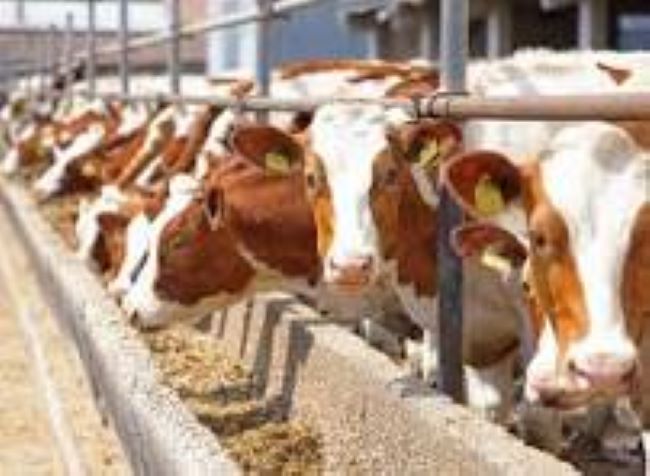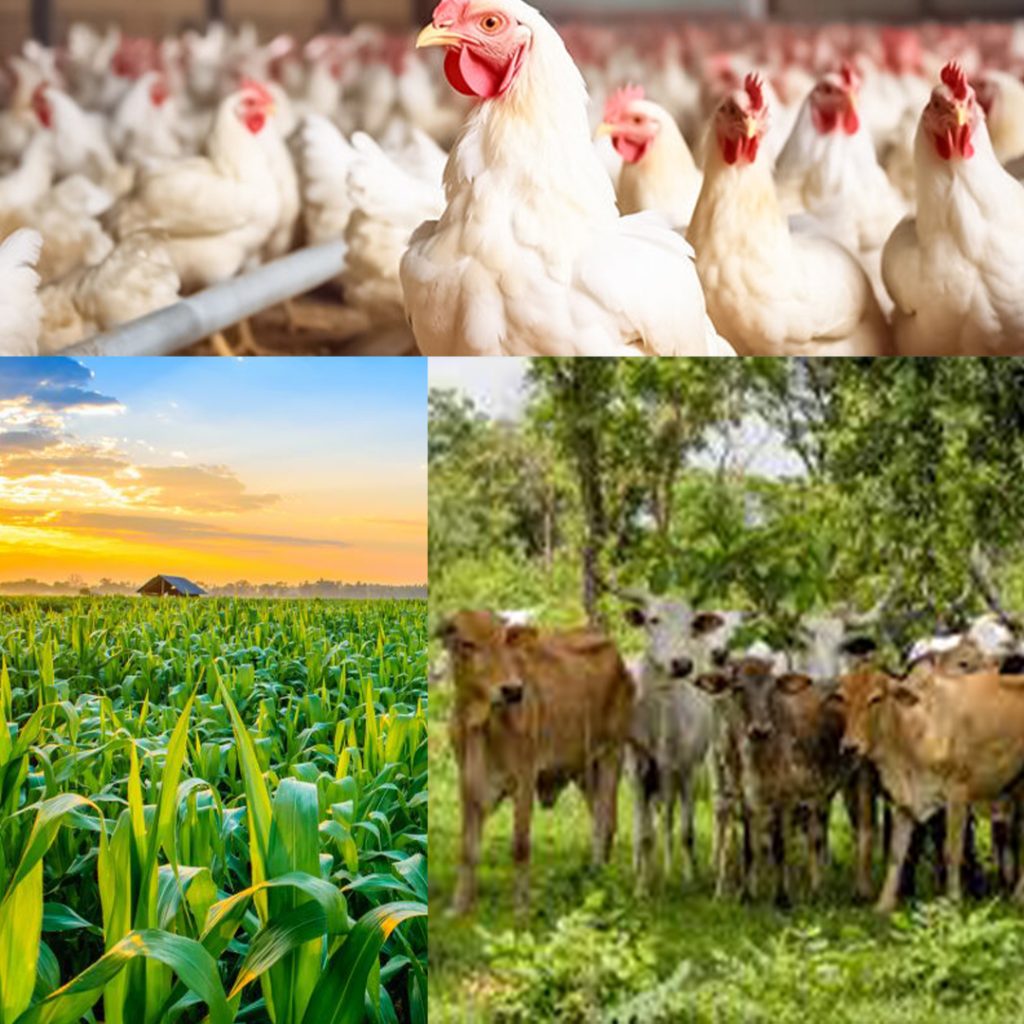Recent hike in the prices of goods, commodities, and inputs as well as diseases and unfavourable environment, have forced many farmers to abandon their farms and negative affecting agricultural production in the country.
This development cuts across animal and crop farming. FarmingFarmersFarms has gathered that many farmers are lamenting that the escalating prices of farming inputs are seriously affecting their work and source of income, which should be addressed without further delay.
According to the former Secretary of the Poultry Farmers Association, Niger State Chapter, Mohammed Adamu, about 65% of poultry farmers in the state have shut down their farms due to cost of inputs and significant reduction in consumer demands for poultry products.
“The poultry industry in Nigeria is generally facing crisis, with many farmers forced out of the business due to escalating input costs and significant reduction in consumer demand amid economic hardship.
This trend poses serious threats to public health, as poultry products are a primary source of protein for Nigerians.
A recent assessment in Niger State revealed an alarming statistics for over 65% of poultry farms have ceased operations with some farmers opting to abandon the industry altogether in favour of alternative ventures.

“This development is particularly concerning, as it may have far-reaching consequences for the nation’s food security and nutritional well-being”, Adamu said. A female poultry farmer, Khadijah Ndanusa said, “It is true; the cost of feeds and layers is affecting poultry farmers.
There is no competition now in poultry farming due to the high cost of birds and feeds. But as for me, I still rear because my customers support me a lot.
No matter the rate at which I sell, they still want my products, which encourages me even with the high prices. I also plant maize, which makes me spend less to produce feeds.
Because I have customers, who still pay ahead, I sell a crate of eggs at N4,700. We used to buy a bag of layers feed at N2,800, but now it is N21,000. Layers feed is the cheapest of the feeds”, she said.
The manager of Sikat Farms, Minna, Suleiman Ubando informed that he closed down his farm after selling all his broilers due to high cost of feeds and a decline in patronage. “I couldn’t continue with the business because even the patronage has dropped.
We sell eggs and chickens at a marginal cost just to get back our investment, but the demand has been affected.
People no longer place orders for eggs, as they used to when a crate was N2,200 or N3,000.
A crate of eggs is now more than N4,000. Consumption has also dropped because consumers have turned to other proteinous foods”, he said.

Meanwhile, pastoralists in Taraba State have lost over 1,000 cows to a disease, which broke out on the Mambilla Plateau in Sardauna local council, described as the worst in the history of livestock production in the area.
The outbreak of hemorrhagic septicemia, a serious cattle disease, was first detected in July this year in Dorofi, Mayo Ndaga, Kwarakwara, Labare, Leme, Furmi and Tep villages. A farmer, Alhaji Yabuba, stated that this was the second time pastoralists were losing a high number of cattle within a short period. “This time, the outbreak in six areas is very devastating because one pastoralist lost about 80 cows and there are others that lost between 50 and 60”, he said.
The state Director of Veterinary Services in the Ministry of Agriculture, Dr. Francis Nathan, revealed that it was a surveillance agent stationed in Gembu, headquarters of Sardauna LGA that reported the outbreak to the ministry.
He said drugs and vaccines were bought from the National Veterinary Research Centre (NVRC) in Vom, Plateau State, for the treatment and immunisation of the cows.
“We quickly moved to the affected areas to start treatment of the affected animals. Over 500,000 cows were treated and vaccinated.
There is serious movement of cattle from the Cameroon Veterinary Research Centre to the Sardauna LGA.
It is the same on our side, and we cannot cross into Cameroon to vaccinate animals, but we ensure a halt to movement of cows in and out of our area to control the spread of diseases”.
Some farmers in the South-South region have similarly expressed concerns over the high cost of food irrespective of the harvest season.
In Rivers State, Mrs. Benedicta Amadi, said the impact of the harvest season was not felt by consumers due to the high cost of transportation. Amadi revealed that a greater percentage of her business profit was currently being factored into transportation costs, which had led to increased costs.
She explained that during last year’s harvest season, a sizable tuber of yam was sold for N800 while currently, the same size was being sold for between N4,000 and N6,000, while urging the Federal Government to be proactive towards implementing its palliative measures in the transportation sector.
A cassava farmer, Mr. Godwin Akandu attributed the price differential to the premature harvest of cassava and vegetables, a measure adopted by farmers to reduce loss in the event of flood disaster.
Garri, a cassava by-product and staple food for households in the state has recorded a huge price gap between the 2023 and 2024 harvest seasons.
A basin of garri, which was sold for N7,000 in 2023, now sells for between N16,000 and N18,000, since both the production and transportation processes are dependent on petrol, he added and in Akwa Ibom, a foodstuff seller, Mrs. Happiness Oboh, said the change in the price of foodstuff, during the current harvest season, was insignificant.
The Chairman, All Farmers Association of Nigeria (AFAN), Akwa Ibom Chapter, Mr. Bassey Inwang, listed high cost of fuel, herders menace and inadequate farmland as part of the factors causing high cost of food. Inwang outlined the blueprint that should be put in place in order to ensure food availability and sufficiency for the people.
He said that timely distribution of farm inputs, grants and loans to farmers would enhance early cultivation because agricultural endeavours are time bound.
Inwang, who included insecurity as a major cause of food insufficiency, stated that fear of being killed or injured had led many to abandon farming, saying that activities of herdsmen had negatively affected farming in the state.
On his part, an Ibadan-based farmer in Oyo State, Mr. Ojo Faniyi also said that astronomic increase in prices of agricultural inputs has negatively affected farming, arguing that high cost of fertilizers, chemicals, and transportation are seriously debarring smooth cultivation of food crops.
The farmer called on the government to come in without further delay to reduce the burden placed on farmers thereby inhibiting agricultural production in the country.
Meanwhile, the Lagos Chamber of Commerce and Industry (LCCI) has identified inflation and high cost of goods and services as unhealthy for the economy.
In a statement signed by its Director-General, Dr. Chinyere Almona, the chamber observed that Nigeria’s inflation moderated to 33.40% in July 2024 from 34.19% in the previous month, as released by the National Bureau of Statistics (NBS).
The slight moderation recorded in the month was the first since December 2022, reflecting ease in price pressures due to a slow-down in demand and some monetary and fiscal policy interventions.
The chamber noted that core inflation, rising from 27.49% in June to 27.47% in July, is a scenario that calls on policymakers to choose the appropriate policy mix to drive down the deceleration of inflationary pressures continually.
In addition, the current inflation environment should also be used as an opportunity to look beyond and consider longer-term issues, particularly in the economy’s agriculture, manufacturing, and export sectors.
The many programmes and policies initiated to tame inflation and stabilise the exchange rate must be sustained and extended to impact more economic players, thereby multiplying the economic effect in the medium term.
“To extend the recorded ease in prices, we must attend to the root causes of food insecurity in Nigeria, such as empowering lowly-skilled farmers with access to required information on crop production, market prices, and technology; providing more agricultural input like fertilizer and extension services; invest more in agrarian mechanisation; resolve land use conflicts; mitigate climate change impact on farmlands; and initiate modern irrigation methods.
Beyond food crops, poultry and fisheries are key drivers of food inflation as common food items like beef, fish, eggs, and chicken have recorded consistently high prices in recent months, contributing significantly to food inflation in the country.
“The newly-created Ministry of Livestock Development is expected to play a critical role in addressing this shortage of poultry and fisheries at a time like this.
The perception about Nigeria continues to take a hit, and investors’ confidence is being beaten down due to threats and fears of insecurity.
The fight against all the elements of insecurity must be sustained to improve on the recent wins by our armed forces”, the group added.
In the same vein, the LCCI, in the “Second-Quarter Economic Growth Indicator and on Sustaining Economic Growth”, stated that the agriculture sector exhibited a modest growth of 1.41%, slightly lower than the 1.50% recorded in Q2 2023, and the non-oil sector, which constitutes the bulk of Nigeria’s Gross Domestic Product (GDP), grew by 2.80%, driven by agriculture and other sectors.
The chamber informed that while the overall GDP growth is commendable, it is imperative that the government remains proactive in addressing key areas to sustain and enhance economic growth in the remaining months of 2024.
“The agriculture sector’s growth remains modest. To harness its full potential and drive more agricultural production, we need to sustain the interventions introduced in the past months, such as the import waivers to agriculture inputs and improving the security situation around our crop production sites.
Additionally, improving rural infrastructure to reduce post-harvest losses and enhance market access is critical”, the chamber added.




1 Comment
Inflation is really killing the economy. The festive season is here and most people can’t afford to buy chicken and livestock because of the price. The government should give urgent intervention to farmers.